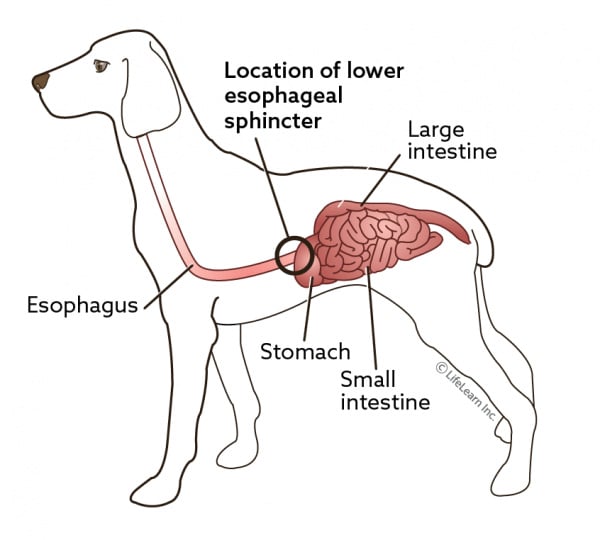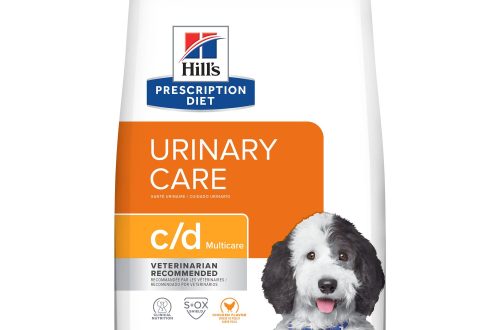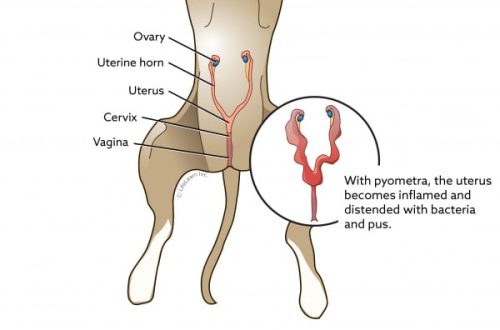
Gastrointestinal pathologies and indigestion in dogs: types and causes
Contents
What are diseases of the gastrointestinal tract (GIT) and indigestion?
Gastrointestinal disorders and diseases affect a dog’s stomach and intestines, causing pain and other health problems. Any disorder that impairs the digestibility or absorption of food, or alters the rate at which it passes through the digestive tract, can be called an indigestion. A healthy digestion is essential for your dog to use the nutrients from the food they eat to build and renew body tissues and provide energy. Gastrointestinal disorders can lead to dehydration, acid-base and electrolyte imbalances and wasting, so it is important to recognize the signs of the disease in time and consult with a veterinarian.
Types and causes of gastrointestinal diseases and digestive disorders in dogs
There are many different types of digestive disorders, so a thorough diagnosis must be made by a veterinarian to determine the exact cause of your dog’s problem.
Causes can range from eating anything other than dog food to food allergies and intolerances, infections, or lack of digestive enzymes. Some dog breeds, such as Great Danes, German Shepherds, Golden Retrievers, and Collies, are more prone to certain digestive problems. The most common diseases are:
Acute gastroenteritis. Inflammation, incl. against the background of infection, the gastrointestinal tract, especially the stomach and intestines. Acute gastroenteritis is usually short-lived and may be caused by the dog eating spoiled or rancid food, high-fat human food, eating foreign objects (such as swallowing a toy), toxic plants, or if the dog has internal parasites (such as roundworms), food allergies or intolerances, she is stressed or eats something that is not intended as dog food.
Colitis. By definition, colitis is an acute or chronic inflammation of the lining of the colon. Most often, it can be caused by whipworm parasitism, tumors or polyps, changes in the daily diet, allergies (including food components), the presence of foreign objects, and some other reasons. Colitis is most common in dogs under 5 years of age and causes inflammation of the colon wall, resulting in frequent and painful bowel movements. Diarrhea may be accompanied by mucus and blood.
Constipation. There are several causes for this disorder, including lack of exercise, dehydration, and eating hard-to-digest foods such as bones, other foreign objects, or foods that are very low in fiber.
Diarrhea. It is often caused by infections, internal parasites, stress, changes in food, abuse of treats, eating leftovers from the table, spoiled food and food waste, as well as dysfunctions of other organs and systems of the animal’s body.
Pancreatitis. Inflammation, incl. caused by an infection of the pancreas (an elongated gland located near the stomach and duodenum that secretes many digestive enzymes and hormones). The cause of pancreatitis often remains unknown.
The main possible causes are: the use of feed or food from the table with a high content of fat, various infections, trauma or bruising, as well as diseases of other organs and tissues.
Exocrine pancreatic insufficiency. This condition is characterized by weight loss, increased appetite, and large amounts of liquid bowel movements.
Violation of absorption processes in the small intestine. Inflammation of the small intestine impairs nutrient absorption and leads to frequent diarrhea, weight loss, and appetite loss.
Does my dog have an indigestion?
The most common symptoms of indigestion are loose stools or diarrhea. If your dog has digestive issues, you may notice some or all of the following symptoms:
- Vomiting
- regurgitation
- Flatulence
- Weakness
- Diarrhea or constipation
Chronic gastrointestinal disease can be a serious problem for a dog and requires careful diagnosis and treatment under the supervision of a veterinarian.
IMPORTANT. If your dog has diarrhea or is vomiting, he may become severely dehydrated. Consult your veterinarian if you notice any of the above symptoms.
Treatment and the importance of proper nutrition
Digestive disorders are quite common and in most cases resolve within a few days. But some dogs need long-term care because they suffer from regular or persistent digestive problems. Your dog’s food can have a significant impact on the health of his gastrointestinal tract. Depending on the specific diagnosis and signs/symptoms, a number of different nutritional approaches may be recommended by a veterinarian.
The main goal of diet therapy is to relieve the symptoms of vomiting and/or diarrhea in the dog. Veterinarians recommend feeding dogs with this disease easy-to-digest food to prevent irritation of the sensitive stomach and intestines. In addition, a diet high in fermentable and non-fermentable dietary fiber, combined with a moderate fat content, helps to maintain proper bowel function in your dog. It is also important to keep your dog hydrated during the recovery period to help her replenish any fluid deficits. Because some of your pet’s gastrointestinal disturbances may be recurrent, long-term monitoring of their diet may be necessary.
To make an accurate diagnosis and discuss treatment options, always consult with your veterinarian and ask them to recommend the best food for your dog’s digestive health.
Digestive Health Questions to Ask Your Veterinarian:
- Are there foods that should be avoided to keep my dog’s digestive system healthy?
- How can ordinary food (such as chocolate or candy) affect a dog’s health?
- Would you recommend Hill’s Prescription Diet or Science Plan for my dog?
- Ask a question about special foods for your dog.
- How much and how often should you feed your dog the recommended food.
- Discuss what treats you can give your dog with the recommended food.
- How quickly will I see signs of improvement in my dog’s condition?
- Can you provide me with a written instruction or checklist for digestive health in dogs?
- What is the best way to contact you or your hospital if I have questions (e-mail/phone)?
- Ask if your pet needs follow-up.
- Specify whether a reminder letter or email notification will be sent.





